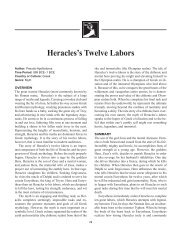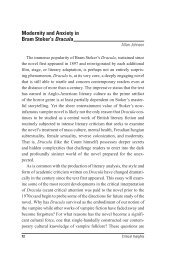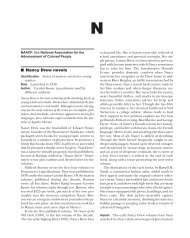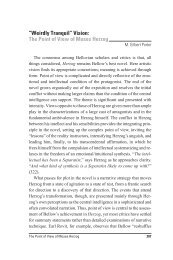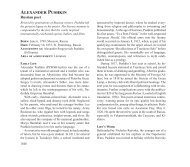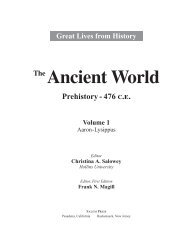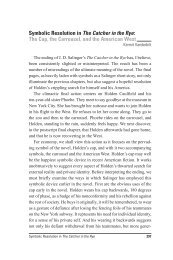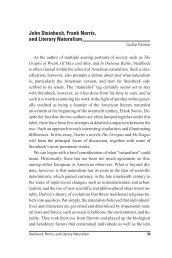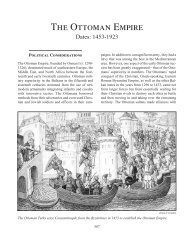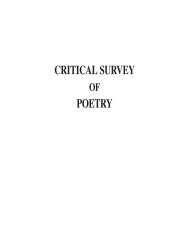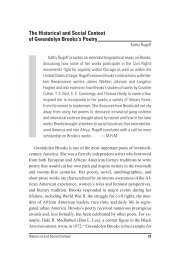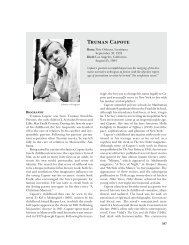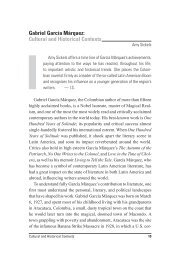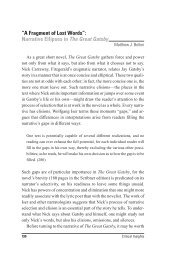Introduction to Poe Criticism Overview: Poe and the ... - Salem Press
Introduction to Poe Criticism Overview: Poe and the ... - Salem Press
Introduction to Poe Criticism Overview: Poe and the ... - Salem Press
You also want an ePaper? Increase the reach of your titles
YUMPU automatically turns print PDFs into web optimized ePapers that Google loves.
<strong>Poe</strong> as Parodist<br />
While <strong>the</strong> discovery of <strong>the</strong> contradictions in <strong>Poe</strong>’s tales led Thompson<br />
<strong>and</strong> o<strong>the</strong>rs <strong>to</strong> see irony, some saw parody <strong>and</strong> hoax. Clark Griffith<br />
argued that <strong>the</strong> Gothic horror tale “Ligeia” contained a disguised<br />
mockery of Transcendentalism. Richard P. Ben<strong>to</strong>n described <strong>the</strong> seemingly<br />
Romantic “The Assignation” as a hoax in which <strong>Poe</strong> parodies<br />
Thomas Moore’s account of Lord Byron’s affair with an Italian countess.<br />
Robert Regan saw “The Masque of <strong>the</strong> Red Death” as playing on<br />
Nathaniel Hawthorne’s “Legends of <strong>the</strong> Province House.” S<strong>to</strong>ries that<br />
most readers have taken <strong>and</strong> continue <strong>to</strong> take seriously were now often<br />
identified as hoaxes or parodies. Griffith read “Ligeia” as covertly parodying<br />
<strong>the</strong> Gothic tradition; Fisher <strong>to</strong>ok a similar view of “The Fall of<br />
<strong>the</strong> House of Usher” (“Germanism”); James M. Cox saw burlesque in<br />
both of those s<strong>to</strong>ries <strong>and</strong> “William Wilson” as well.<br />
To readers new <strong>to</strong> <strong>Poe</strong>, <strong>the</strong> idea that his seemingly dark <strong>and</strong> horrifying<br />
tales could be read as humorous is incredible. It is worthwhile,<br />
<strong>the</strong>refore, <strong>to</strong> consider <strong>the</strong> basis for such claims. In essence, <strong>the</strong> reasons<br />
are two.<br />
The first is <strong>Poe</strong>’s often abominable writing, a long-st<strong>and</strong>ing issue in<br />
<strong>the</strong> study of <strong>Poe</strong>. If he is such a great writer, <strong>the</strong> question is asked, why<br />
are his tales filled with passages that are overwrought, clichéd, or silly?<br />
For some, <strong>the</strong> answer is, <strong>Poe</strong> is not a great writer. <strong>Poe</strong>’s contemporary,<br />
<strong>the</strong> poet James Russell Lowell, mocked <strong>Poe</strong> as “three-fifths genius <strong>and</strong><br />
two-fifths sheer fudge.” The aris<strong>to</strong>cratic Henry James declared that “an<br />
enthusiasm for <strong>Poe</strong> is <strong>the</strong> mark of a decidedly primitive stage of reflection.”<br />
American-born English poet T. S. Eliot sneered that <strong>Poe</strong> had “<strong>the</strong><br />
intellect of a highly gifted young person before puberty.” English<br />
writer Aldous Huxley said that <strong>Poe</strong> was “cursed with incorrigible bad<br />
taste.” He considered <strong>Poe</strong>’s writing “vulgar,” like wearing a “diamond<br />
ring on every finger.” The highborn Irish poet William Butler Yeats<br />
also thought “vulgar” <strong>the</strong> best word. When a friend sent Yeats a copy of<br />
<strong>Poe</strong>’s poems that he had illustrated, Yeats wrote back <strong>to</strong> tell <strong>the</strong> illustra<strong>to</strong>r<br />
he was wasting his talents. The gifted poet described <strong>Poe</strong>’s work as<br />
<strong>Introduction</strong> <strong>to</strong> <strong>Poe</strong> <strong>Criticism</strong> 45



